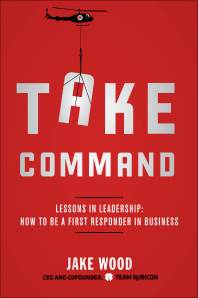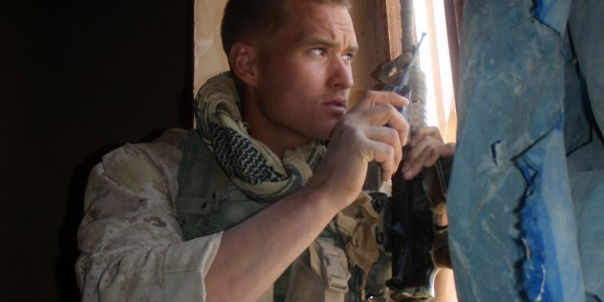[soundcloud url=”https://api.soundcloud.com/tracks/172999933″]
Videos by Rare
Kurt Wallace: This is Kurt Wallace and our guest today on Rare is Jake Wood, a Marine veteran of Iraq and Afghanistan, CEO of Team Rubicon and author of “Take Command, Lessons in Leadership: How to Be a First Responder in Business” and Jake, thanks for being with us today.
Jake Wood: Yeah, of course. Thanks for having me.
Kurt Wallace: Tell us about yourself with your transition from a combat veteran to someone involved in emergency response.
Jake Wood: Yeah, you know the transition itself was actually pretty accidental. Got out of the Marine Corps in late 2009 and wanted to be an entrepreneur. Was looking at going to grad school to go get my MBA. Really felt like I needed to do that during my transition in order to gain credibility.
When the Haiti earthquake happened, it was really just more a spontaneous moment where myself and a couple of other marines and doctors decided that we wanted to get down there and help. We took a team down to Port-au-Prince about three and a half – four days after the earthquake. And, it was just kind of down there that we discovered the opportunity that really became Team Rubicon — the opportunity to use the skills and experiences of military veterans for first response for this disaster assistance work. Along the way; also, of course, discovered that it was a really powerful opportunity for the veterans that were getting involved.
Kurt Wallace: I think that it’s amazing to take the position that veterans can go out and do humanitarian effort. You’ve pitched this in a Time magazine article stating “How much farther could we get with an army of humanitarians than with ever-expanding fleets of drones?” Could you elaborate?
Jake Wood: Yeah, I think there’s a couple of different angles for the article that I wrote there. I think that first and foremost — from a foreign policy perspective — we really need to think about the underlying causes of some of these civil wars and some of these terrorist hotbeds around the world.
I’m certainly not the smartest guy in the room and there’s a lot of really bright people working over at the State Department in this humanitarian and international development work. But, for my experiences in a country like Afghanistan — the violence. We’re past, largely, the violence from the Taliban. It’s still happening. You know we’re still being attacked by Taliban forces. But, the vast majority of attacks that we were experiencing when we were over there were from 19-year-old disenfranchised kids who were unemployed, who were bored who were looking to make a buck. And, those aren’t the wars that we should be fighting. And, these were the types of kids that if they had an economy in the Helmand Valley, where I was, they likely would not have been fighting.
And, fast forward four or five years to the work that I’m doing today with Team Rubicon. I look at this from a different angle now. We have 2.5 million veterans that are coming back from Iraq and Afghanistan. They are entrepreneurs. They’re problem solvers. They have big hearts. They want to still serve. And, as they’re transitioning back into civilian life a lot of them are finding jobs in the civilian sector that aren’t providing them with that sense of purpose that they had when they were wearing a uniform. And, I think that we can find ways to project American aid through this talent pool — these 2.5 million veterans of Iraq and Afghanistan around the world.
Kurt Wallace: I’ve often said the way we win people over — other countries, people that are supposedly our enemies — is not through the barrel of a gun, but through a relationship of free market, trade and innovation. Is that the direction that you’re talking about going in?
Jake Wood: Yeah, absolutely. Don’t get me wrong. There are undoubtedly bad people in this world and there is a real need for us to go in and kick down doors on occasion and get bad people. I’m not saying that. I’m not suggesting that. But I do think that you’re right. The next wars are going to be prevented with economic empowerment and access to markets and the ability to make a fair wage and, like you said, you can’t do that through the barrel of a gun.

Kurt Wallace: Now, in your article, the Time magazine article, you say “The challenge is finding a way to re-deploy them (being veterans) not as warriors, but as peacemakers.” And, a combination of independent private, nonprofit organizations, philanthropists utilizing some of the systems the government already has in place. I think this is a great solution. As a libertarian, I don’t think the government really does anything very well except spend money that isn’t there. So, in terms of this position and how to make this happen, what do you see?
Jake Wood: Well, the article was purposefully light on courses of action on how to move forward with this. I think that we have a pretty innovative solution that we’re working on at Rubicon and that’s, of course, the private sector solution — the nonprofit solution.
I do think that there’s a role for government in this. I think that when you look at the need from a policy perspective, from the resources the government will be able to provide in actually execution down range; I don’t think that you’d be able to do this effectively without them at the table.
But, I think you’re right the government simply could not take this idea and run with it and say that “Okay, we’re going to come back and we’ll have the answer.” I think we both agree that would not work well.
So, it’s going to have to be a chart moving forward that combines public and private efforts. It’s going to have to require buy-in from different levels of the government and from society itself. And truthfully, I think there’s going to be a lot of people that are going to be really skeptical. You’re going to have a lot of people that say, “Wait so you’re going to take all of these, insert: killer, these monsters that were fighting over in Iraq and Afghanistan. Now, you want to send them over as peacemakers. That’s the dumbest idea in the world.”
And, I think perhaps on the surface people don’t want to look any further into it. That may not be a crazy statement to make. But, I think if you look deeper at the issue on both sides, the veteran integration issue as well as the policy issue in international development, I think, it starts to make more and more sense.
Kurt Wallace: Your book, “Take Command”. You talk about the leadership abilities that you learned from being in the military. You’re a marine and how to apply that in the business sector. This is a very interesting perspective. Can you elaborate on what your book is designed to teach?
Jake Wood: Yeah, so the last ten years of my life have really been an evolution for me personally in leadership and a constant lesson. It started when I was at the University of Wisconsin. I was playing football there. Turns out, I was a pretty shitty football player.
And, I find myself in the Marine Corps in 2005. I always thought that I was a pretty decent leader. And, early on in my time in the Marine Corps, I quickly discovered that I wasn’t half the leader that I thought I was.
So, I continued to learn and learn – really in the toughest situations imaginable. Leading a squad of marines through the Triangle of Death and during the surge in Iraq in 2007 and being part of a really small and elite scout sniper team in Afghanistan in 2008.
Then, becoming an entrepreneur.
Again, I got out of the Marine Corps and, again, I thought of myself as a pretty decent leader. Being an entrepreneur now — trying to help build an organization and inspire and lead volunteers and convince institutional investors to buy into the concept of what we’re doing. I learned once again that I really had a lot to learn about leadership.
So, really the last ten years are encompassed in this book, and it’s broken down pretty simply into four sections: preparation, analysis, decision-making and, finally, action.
I try to keep it simple, and I try to really relay these eight principles through just really personal stories of mine from over the last ten years. And, I think that it’s — I try to make the concepts as relatable as possible. But, also, have a fresh perspective and take on them so that they can impact anybody that’s looking to lead a team. Be it small or large within really any type of industry.
Kurt Wallace: Jake Wood author of “Take Command”. Thank you for being with us today on Rare.
Jake Wood: Yeah, it’s a pleasure. Thanks for having me.



